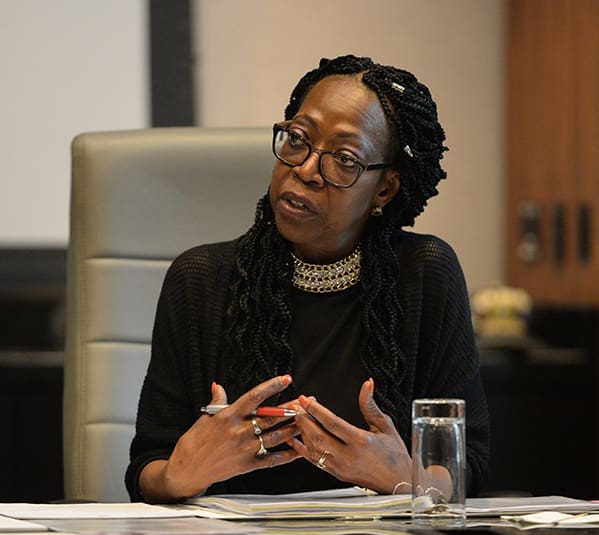
Atlanta
Archdiocese partners with NAMI Georgia to promote mental health awareness
By ERIKA ANDERSON REDDING | Published October 3, 2019
ATLANTA—In the U.S., one in five people lives with a mental health condition. But many believe that the church could—and should—be a lifechanging resource for those who wish to begin a journey toward healing.
In collaboration with the Archdiocese of Atlanta Disabilities Ministry, the National Alliance on Mental Illness (NAMI) Georgia is hoping to train those who lead ministries in the archdiocese to help people who are affected by mental illness.
Maggie Rousseau, director of the archdiocesan Disabilities Ministry, said that NAMI is a natural fit for the archdiocese.

Homefront instructor Sandra Williams shares some information with those present during a class provided by the National Alliance on Mental Health (NAMI) last June at the Eucharistic Congress. Photo By Johnny Crawford
“One out of every four families in a parish will have to cope with the effects of mental illness. By working collaboratively with NAMI and similar organizations, we hope to educate and raise awareness about such conditions as depression, bipolar disorder and schizophrenia,” Rousseau said. “We also hope to end the stigma associated with mental health disorders so that individuals and their families with mental health challenges will reach out for help and know that recovery is possible and can lead an individual to a full and productive life.”
In June, the archdiocese hosted a NAMI Georgia class called Introduction to Behavioral Health Disorders and Addictive Diseases (IBHAD) for clergy and ministry leaders. The mission of NAMI is “to empower affiliates to create communities where all affected by mental illnesses find hope, help, and acceptance through support, education and advocacy.” For more than 40 years NAMI has worked to ensure all affected by mental illness receive the support they need. Sara Karaga, program supervisor for NAMI Georgia, said that the mission to provide care for those who may not otherwise receive it aligns for both NAMI and the archdiocese.
“When you look at the state of Georgia, we continue to see a gap in care for those who are experiencing mental health conditions. In fact, 59 percent of adults with a mental illness in Georgia did not receive care in 2018. Care is a simple four-letter word, but a powerful way to change lives for people affected by mental illness. It’s an action. It’s a feeling. It’s a gift we give to ourselves and to each other,” she said. “As we brainstorm ways to expand our reach throughout the state, we needed to think big in terms of outreach. The Archdiocese of Atlanta has been providing hope to some of the most underserved communities in North Georgia since its origins. NAMI Georgia looks forward to supporting the mental health awareness efforts of the Archdiocese of Atlanta.”
Becoming allies
The June class focused on topics including an overview of community resources, living in recovery, de-escalation techniques, and more information about the ways faith-based communities can be involved in mental health advocacy.
NAMI Georgia offers free classes specifically designed for those who can make a difference, Karaga said.
“Mental illness affects every single one of us whether it’s through personal lived experience, friends, family members or our communities. We also know that up to 90 percent of individuals have a significant reduction of symptoms and improved quality of life with appropriate treatment and support. The research is all there. If we come together as a community, we can drastically change our own future,” she said. “Our free classes give individuals the skills to become an ally. We have classes tailored for all members of the community— from those with lived experience of a mental health condition, to clergy, law enforcement, teachers, parents, students and advocates. Our classes and support groups benefit every person who is interested in spreading a message of hope.”
Father Desmond Drummer, pastor of Most Blessed Sacrament Church, and chaplain of Our Lady of Mercy High School in Fairburn, attended the first NAMI Georgia class at the Chancery in Smyrna. He said that after five years as a priest, he has seen firsthand the pressing need for more resources for treating mental health.
“Church ministers of all types have a particular responsibility to develop capacity in our faith communities so that we can support people with mental illness, eliminate stigma and direct people who are not receiving care to the resources that will enable them to thrive,” he said.
The class helped Father Drummer to realize his role in helping those who turn to him with mental health issues.
“I was particularly encouraged when the presenters from NAMI indicated that mental health professionals and researchers are becoming increasingly receptive to the role faith has in people’s lives,” he said. “As a priest, I certainly believe that religious workers have the responsibility to embrace the competencies of mental health professionals by affirming their work both publicly and in one-on-one pastoral conversations.”
Rousseau believes the collaboration between NAMI Georgia and the archdiocese to work with clergy and ministry leaders is crucial.
“Often a person with mental health challenges is alienated from community, both parish and public life. Pastors, deacons, and parish staff are often called upon to provide support. It is important to see the person first and not their illness, to be a place of welcoming,” she said. “Training is necessary so that we understand how to support.”
For Father Drummer, he said his biggest takeaway from the class was the necessity to remove the stigma that so often surrounds mental health issues.
“We must become more literate and transparent within our faith communities. Priests have the capacity to lead by example. As public people, we can speak openly about our own experiences with therapy as well as share with our communities what we’ve learned when we acquire new information on mental health. A witness who shared her story with us conveyed that when her church prayed for people and families living with mental illness, she felt support and included,” he said. “We can certainly begin (or continue) including prayers such as these in our liturgies and devotions. All of this can begin today.”
NAMI Georgia hosted a second training at the Eucharistic Congress June 22. This program, called NAMI Homefront, is designed for families, caregivers and friends of military service members and vets with mental health conditions. And Rousseau hopes to continue this training within the archdiocese.
Contact Maggie Rousseau at mrousseau@archatl.com for more information about scheduling a NAMI training for your parish.
